Immigration detention is a pressing issue in Florida, with a high number of detention centers, lack of legal representation, and poor conditions within these facilities.
This article explores the consequences of immigration detention, including the separation of families, mental and physical health issues, and the financial burden on taxpayers.
It offers solutions to address these issues, such as increasing access to legal representation, improving conditions in detention centers, and implementing alternatives to detention.
Find out how individuals can help make a difference by educating themselves, volunteering, contacting local representatives, and supporting policy changes.
Key Takeaways:
- High number of detention centers, lack of legal representation, and poor conditions contribute to immigration detention issues in Florida.
- Consequences of immigration detention include family separation, mental and physical health issues, and financial burden on taxpayers.
- Solutions to address immigration detention issues include increasing access to legal representation, improving conditions in detention centers, and implementing alternatives to detention.
What Is Immigration Detention?
Immigration detention involves the practice of holding individuals suspected of violating immigration laws, typically in facilities managed by agencies like ICE and private prison corporations.
The primary goal of immigration detention is to enforce compliance with immigration laws and prevent individuals from avoiding immigration proceedings or removal orders.
The legal framework governing immigration detention is diverse, with regulations outlined in the Immigration and Nationality Act permitting the detention of specific groups of immigrants. Various detention centers exist, including dedicated ICE detention facilities and contracted facilities operated by private entities, to cater to the increasing number of individuals requiring immigration enforcement.
Why Is Immigration Detention an Issue in Florida?
Immigration detention in Florida is a topic of contention due to the state’s numerous detention centers, legislative initiatives spearheaded by Governor Ron DeSantis, and continuous debates surrounding illegal immigration and its effects on the community.
1. High Number of Detention Centers
Florida houses several notable detention centers including the Glades County Detention Center, Krome North Processing Center, Baker County Detention Center, and Broward Transitional Center. The Glades County Detention Center, positioned near Lake Okeechobee, can accommodate approximately 600 detainees and has received criticism for its harsh living conditions.
In contrast, the Krome North Processing Center in Miami is recognized for its stringent security measures and specialized immigration processing services.
The Baker County Detention Center, situated in Macclenny, has a smaller capacity compared to others but is known for issues related to overcrowding. The Broward Transitional Center, operated by a private corporation, has been involved in controversies regarding the treatment of detainees.
2. Lack of Legal Representation
An important issue in Florida’s immigration detention centers is the lack of sufficient legal representation for detainees, a concern raised by organizations like the ACLU of Florida and the University of Miami School of Law.
Detainees encounter various obstacles when seeking legal assistance, including language barriers, complex legal procedures, and limited resources within the detention facilities. Without adequate representation, individuals often find it challenging to navigate the complexities of immigration law, potentially leading to misunderstandings or missed opportunities for relief.
Advocacy organizations play a crucial role in addressing this issue by offering pro bono legal services, educating individuals on their rights, and assisting them in securing legal representation.
The absence of competent legal assistance can have a significant impact on the outcomes of detainees’ cases, influencing their chances of obtaining relief or facing deportation.
3. Poor Conditions in Detention Centers
In Florida, there is a significant concern regarding the poor conditions in ICE detention facilities that are managed by private prison corporations like Corrections Corporation of America and GEO Group, Inc.
Reports from these facilities highlight troubling instances of insufficient healthcare services, where detainees are frequently denied access to basic medical care or experience significant delays in getting essential treatment. The problem of overcrowding further complicates matters, as it hampers the staff’s ability to deliver adequate care.
Additionally, substandard sanitation practices contribute to unhygienic living conditions, elevating the risk of infectious diseases spreading among detainees. These conditions have resulted in substantial criticism and calls for reform within the system.
What Are the Consequences of Immigration Detention?
The effects of immigration detention go beyond just the detainees, impacting families, mental and physical health, and placing a substantial financial strain on taxpayers.
1. Separation of Families
One of the significant consequences of immigration detention is the separation of families, resulting in distressing situations for children and their immigrant parents.
The impact of family separation extends beyond physical distance, often leading to substantial emotional trauma for both parents and children. Research indicates that children who undergo this trauma are at a higher risk of developing anxiety, depression, and behavioral problems. The psychological burden of uncertainty regarding reunification with loved ones can have enduring effects.
Instances of families being separated at borders underscore the profound pain and suffering stemming from policies that prioritize enforcement over family welfare.
2. Mental and Physical Health Issues
Detainees frequently experience significant mental and physical health challenges, including post-traumatic stress disorder, often attributed to the stressful conditions found in detention facilities.
These health concerns are often exacerbated by factors such as overcrowding, limited access to appropriate medical care, and the emotional toll of separation from family members.
Research indicates that detainees commonly present with symptoms of depression, anxiety, and other psychological ailments as a consequence of their confinement. The incidence of infectious diseases like tuberculosis and HIV/AIDS is notably higher among detainees compared to the general population.
Inadequate nutrition and hygiene facilities within these environments further contribute to the decline in health conditions experienced by individuals in detention.
3. Financial Burden on Taxpayers
The financial burden on taxpayers from immigration detention is sizable, influenced in part by policies such as the detention bed quota mandated by ICE. This quota necessitates a specific number of beds to be occupied daily at immigration detention centers, leading to higher costs per detainee.
These expenses encompass housing, healthcare, security, and administration, all of which accumulate significantly over time. Consequently, taxpayers shoulder the majority of these costs, with billions of dollars allocated annually to sustain these facilities.
Critics contend that the emphasis on detention quotas diverts resources from more cost-effective alternatives like community-based supervision programs, which could result in savings for taxpayers in the long term.
What Are Some Solutions to Address Immigration Detention Issues?
Addressing the issues of immigration detention necessitates multifaceted solutions, such as enhancing access to legal representation, enhancing conditions in detention centers, and implementing Alternatives to Detention.
1. Increase Access to Legal Representation
Increasing access to legal representation is essential, with advocacy organizations such as the ACLU and HOPE Public Interest Resource Center playing a crucial role in offering legal assistance to detainees.
These organizations are dedicated to ensuring that every individual, regardless of their background or financial situation, has the opportunity to seek justice and uphold their rights.
Despite their efforts, many individuals still encounter obstacles in obtaining legal representation due to factors like limited resources, lack of awareness about available services, and geographic limitations. This can lead to vulnerable populations being left without the necessary legal assistance in critical situations.
Advocacy groups are actively working to address this issue through outreach programs and community partnerships. They aim to raise awareness, provide education, and advocate for policy changes that improve access to legal services.
2. Improve Conditions in Detention Centers
Improving conditions in detention centers requires addressing issues concerning healthcare, sanitation, and oversight to ensure detainees are treated humanely. For example, mental health support should be easily accessible for individuals experiencing trauma or distress, and access to clean water and proper sanitation facilities is crucial to uphold basic hygiene standards.
Increased oversight and accountability mechanisms play a vital role in preventing instances of abuse and ensuring detainees receive dignified treatment. Implementing regular inspections by independent bodies can help maintain transparency and uphold international human rights standards within these facilities.
3. Implement Alternatives to Detention
Implementing Alternatives to Detention, such as GPS monitoring and community support programs, offers solutions for managing immigrant populations in a humane and cost-effective manner.
GPS monitoring enables authorities to track individuals in real-time, ensuring compliance with immigration regulations while allowing individuals to maintain their daily routines and family connections.
Community support programs provide a more personalized approach by offering counseling, legal assistance, and access to social services to help individuals navigate the system and integrate into society successfully.
Successful implementation examples include the Intensive Supervision Appearance Program (ISAP) and the Family Case Management Program (FCMP), which have demonstrated reduced rates of detention and increased compliance with court appearances.
How Can Individuals Help Address Immigration Detention Issues?
People can have a significant impact on addressing immigration detention issues by engaging in education, advocacy, volunteering, and supporting policy changes aimed at promoting humane treatment of immigrants.
1. Educate Themselves and Others
Education and awareness about immigration laws and the realities of detention are essential initial steps individuals can take to make a difference. By being informed, one can better understand the challenges faced by immigrants and refugees, and advocate for more compassionate policies.
Resources such as legal aid organizations, community workshops, and online platforms like official government websites and reputable NGOs can provide valuable insights into the complexities of immigration issues. Spreading awareness not only helps in dispelling misconceptions but also creates a more inclusive and supportive environment for those experiencing migration.
It’s crucial for individuals to stay updated on current laws and regulations to effectively participate in discussions and initiatives that aim to promote justice and equality.
2. Volunteer or Donate to Organizations
Volunteering or donating to organizations such as the ACLU and the United States Conference of Catholic Bishops can offer vital support to individuals affected by immigration detention.
These organizations, along with Human Rights First and the Detention Watch Network, actively work towards policy changes and provide legal aid to those in detention.
Volunteer opportunities may involve providing language assistance, offering pro bono legal services, or aiding in advocacy campaigns. By engaging with these organizations, individuals can directly contribute to enhancing the conditions within immigration detention centers.
Contributions to these organizations can assist in funding legal representation, support services, and advocacy initiatives, ultimately leading to a concrete impact on the lives of those impacted by immigration detention.
3. Contact Local Representatives
Reaching out to local representatives to advocate for humane immigration policies and necessary policy changes is a significant way individuals can contribute to systemic change.
Engaging with representatives can be perceived as a challenging task, but there are several key strategies that can enhance the effectiveness of the process. One recommendation is to express your message clearly in a concise and respectful manner, emphasizing the specific changes you are advocating for. Additionally, incorporating personal anecdotes or data can bolster your argument and make it more persuasive.
It is crucial to follow up with representatives after initial contact to maintain the conversation and reinforce your message. Through active participation in civic engagement and communication with representatives, individuals can play a crucial role in influencing policy changes that resonate with their values and beliefs.
4. Support Policy Changes
Advocating for policy changes at state and federal levels, such as those suggested by Congress and influenced by state leaders like Governor Ron DeSantis, is crucial for improving immigration detention practices.
Implementing specific policy recommendations, such as enhancing oversight of detention facilities and investing in alternatives to detention, can help ensure that individuals receive humane and fair treatment within the immigration system.
Advocating for these changes through grassroots organizing, contacting local representatives, and participating in peaceful demonstrations can amplify the public’s voice in influencing legislative reforms. By actively participating in these initiatives, individuals can play a significant role in shaping a more equitable and compassionate approach to immigration detention.
Frequently Asked Questions
What are the current immigration detention policies in Florida?
As of 2021, Florida’s immigration detention policies are managed by the Florida Department of Corrections and the U.S. Immigration and Customs Enforcement.
How many undocumented immigrants are currently detained in Florida?
According to recent data, there are approximately 2,000 undocumented immigrants currently detained in Florida.
What are some of the main issues facing immigrants in Florida detention centers?
Some of the main issues include inadequate medical care, overcrowding, and lack of access to legal representation.
How can I support immigrants in Florida facing detention issues?
You can support by volunteering at local organizations, donating to legal aid funds, and advocating for better policies and conditions for immigrants in detention centers.
What are some possible solutions for addressing immigration detention issues in Florida?
Possible solutions include implementing alternatives to detention, reforming detention policies, and increasing oversight and transparency in detention center operations.
What resources are available for immigrants and their families in Florida?
There are several organizations and resources available, such as legal aid organizations, community support groups, and immigrant rights advocacy groups.

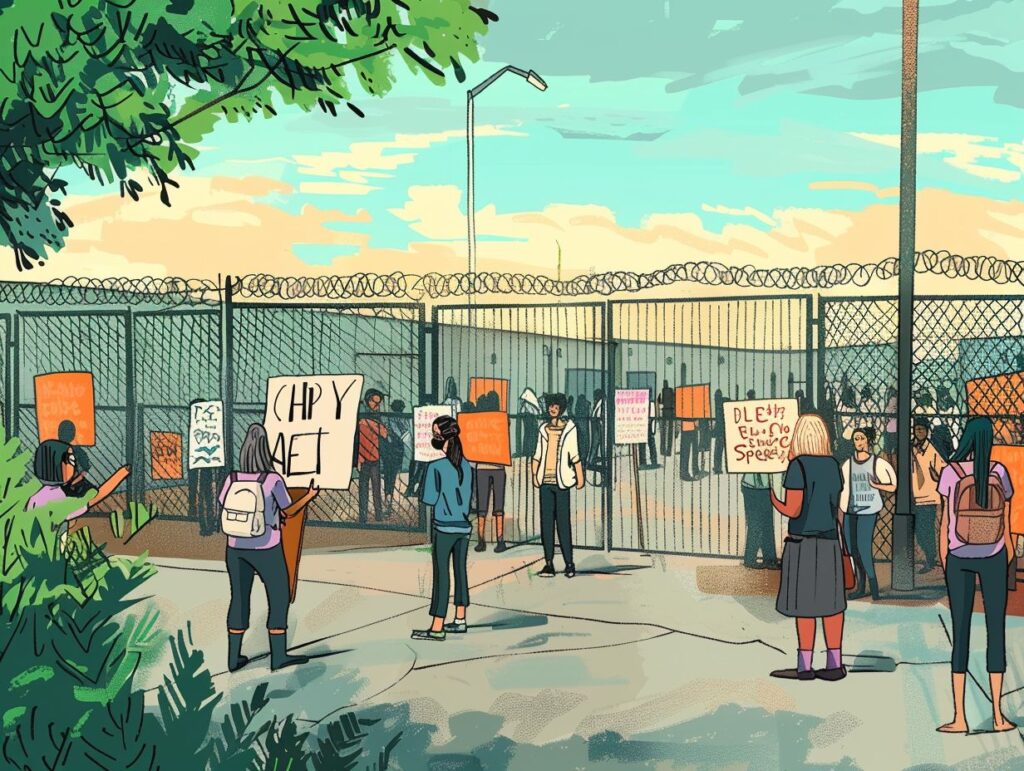
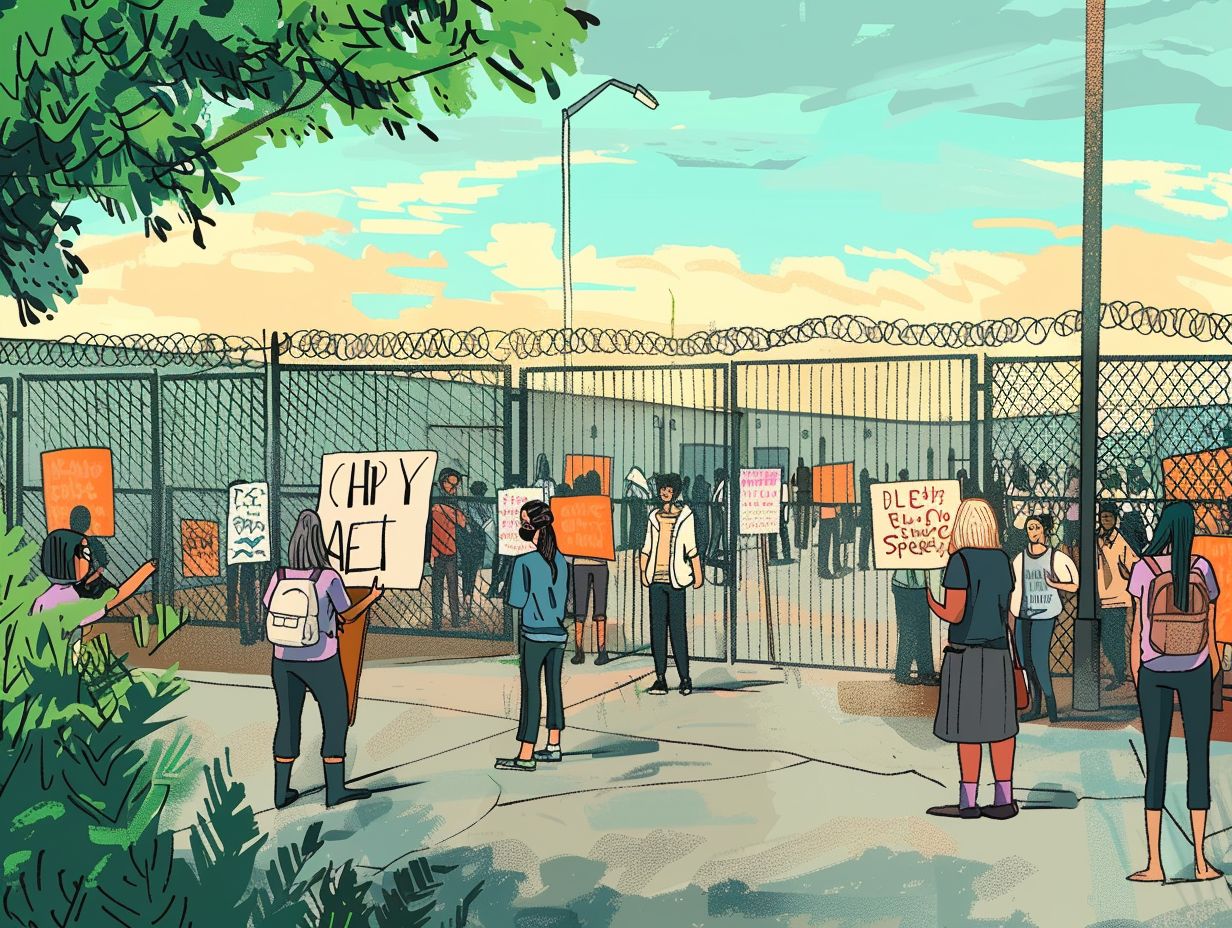
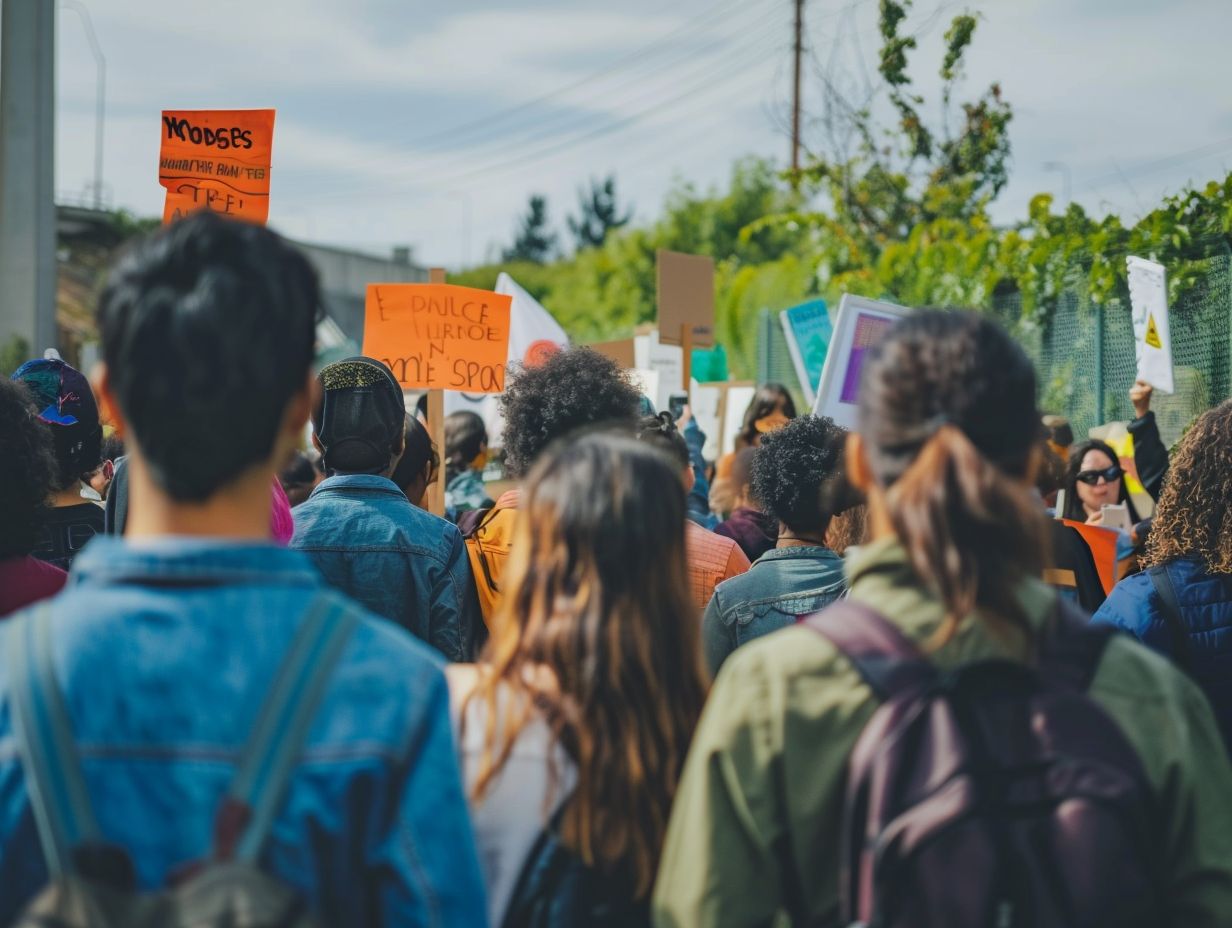
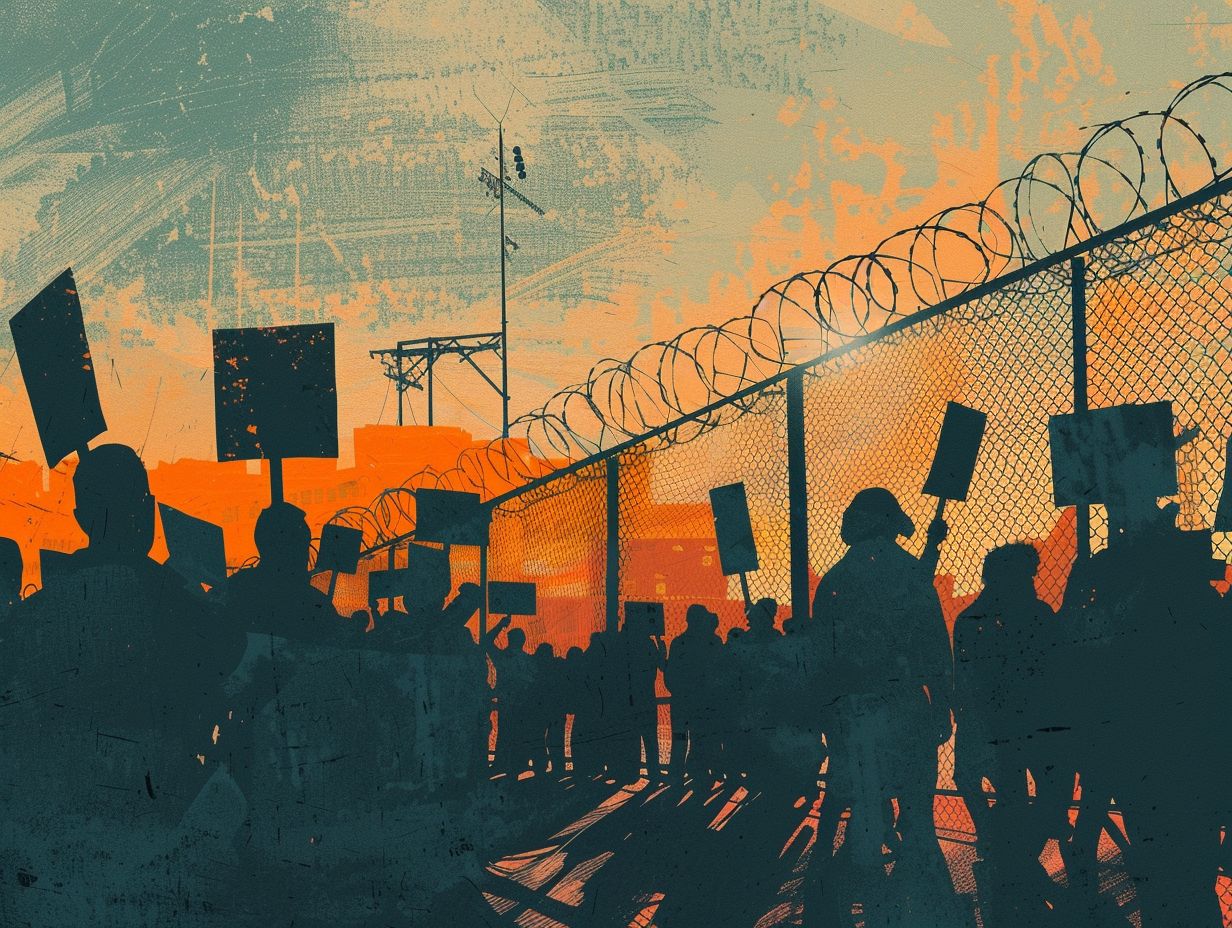
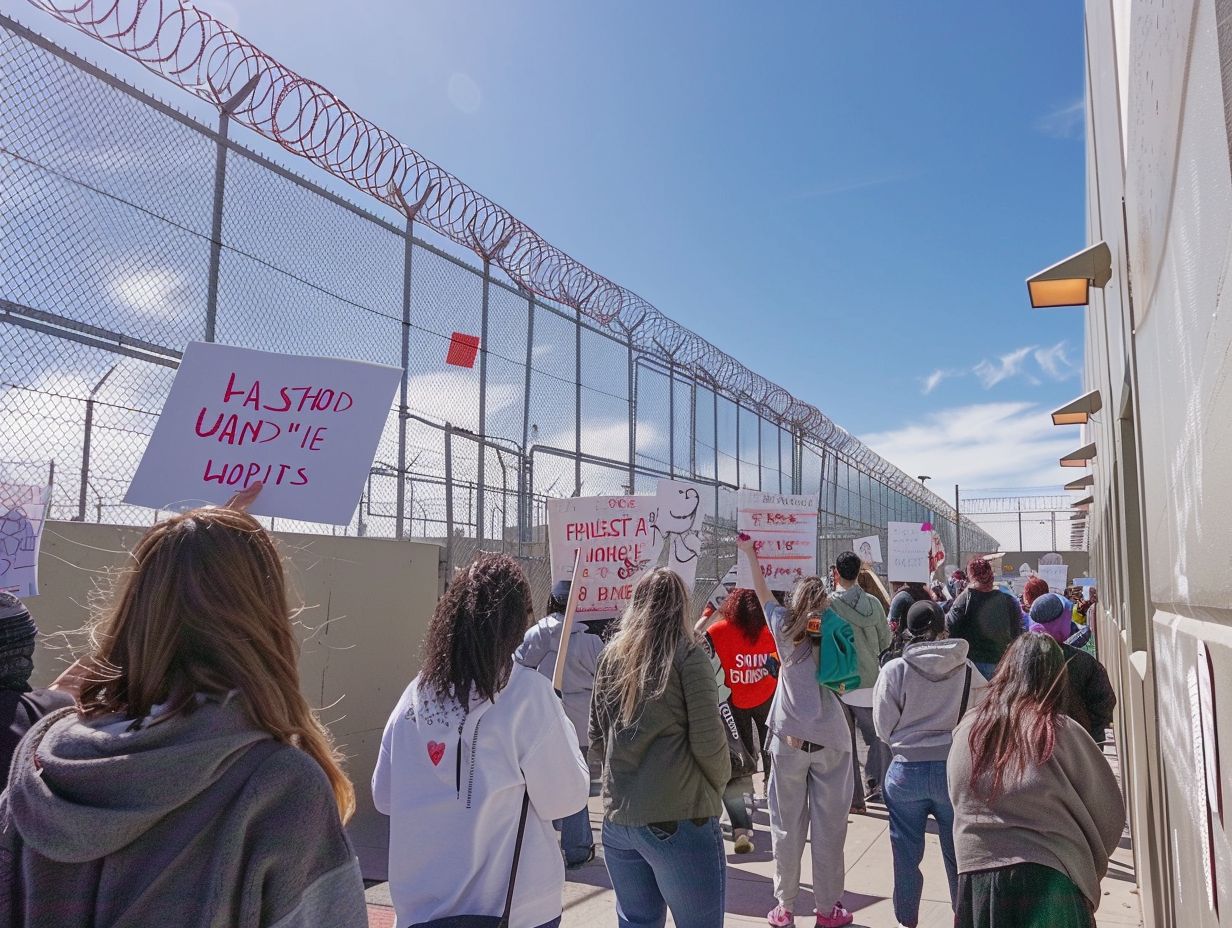





















Rate this article:
Average rating 0 / 5. Vote count: 0
No votes so far! Be the first to rate this post.
No Comments yet!